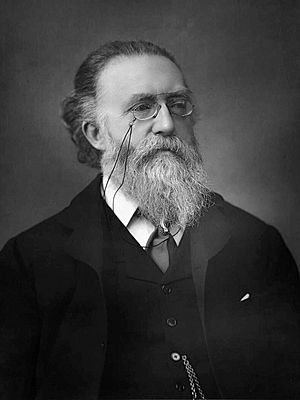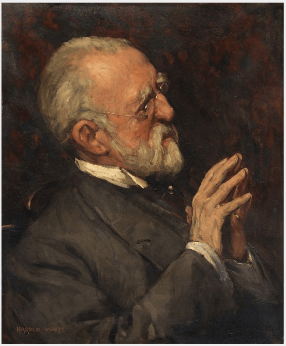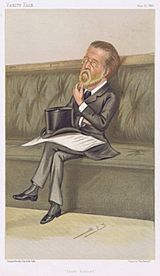Justin McCarthy (politician) facts for kids
Quick facts for kids
Justin McCarthy
|
|
|---|---|

McCarthy in 1891
|
|
| Leader of the Irish National Federation | |
| In office 1891–1892 |
|
| Succeeded by | John Dillon |
| Personal details | |
| Political party | Irish Parliamentary Party Irish National Federation |
Justin McCarthy (born November 22, 1830 – died April 24, 1912) was an important figure in Ireland's history. He was an Irish nationalist, a journalist, a historian, a writer of novels, and a politician. He served as a Member of Parliament (MP) from 1879 to 1900. This meant he had a seat in the House of Commons in the United Kingdom of Great Britain and Ireland.
Early Life and Career
Justin McCarthy was born in Cork City, Cork, Ireland. He also went to school there. He started his career as a journalist when he was just 18 years old in Cork. From 1853 to 1859, he worked for a newspaper called the Northern Daily Times in Liverpool. In 1855, he married Charlotte Ailman.
In 1860, he moved to London. There, he became a reporter for the Morning Star newspaper. By 1864, he became the editor of that newspaper. He left this job in 1868. After giving talks in the United States, he joined Daily News in 1870. He worked there for 23 years. He also wrote for other magazines like The Fortnightly Review and The Nineteenth Century. He was known for supporting liberal ideas at that time. He gave more talks in America in 1886 and 1887.
Political Journey
McCarthy first became a Member of Parliament (MP) in 1879. He was elected without anyone running against him for County Longford. He was part of the Home Rule League, a group that wanted Ireland to have more control over its own affairs. He was re-elected in 1880.
Later, the Longford area was split into two parts. McCarthy was then elected for the Northern division of Longford. He was part of the Irish Parliamentary Party. In this election, his opponent only got a small number of votes.
In the 1886 election, he was again elected without opposition in North Longford. He also ran in Londonderry City. He seemed to lose there by a very small number of votes. However, the result was later changed, and McCarthy chose to represent Londonderry City.
Around 1890, there was a big disagreement involving Charles Stewart Parnell, who was the leader of the Irish Parliamentary Party. The British Prime Minister, Gladstone, warned that if Parnell stayed as leader, their alliance would end. This would also mean the end of their support for Home Rule for Ireland. This warning was given to Justin McCarthy to pass on. However, the party members re-elected Parnell as their leader.
After more meetings, Parnell refused to step down. This caused the Irish Party to split into two groups. McCarthy became the leader of the group that was against Parnell, called the Irish National Federation. He held this position until 1896. Even though he was chairman, McCarthy was known for his calm and orderly approach to politics. He was not seen as a strong political leader in the same way Parnell was.
In the 1892 election, McCarthy ran in both North Longford and Londonderry City again. He lost in Londonderry City by a small margin. So, he represented North Longford, where he won with a very large majority of votes. He was re-elected without opposition in North Longford in 1895. He then left Parliament in the 1900 election.
Writing Career
Many people believe that Justin McCarthy's true talent was as a writer. He published his first novel, Paul Massie: A Romance, in 1866. He wrote several other popular novels, including A Fair Saxon (1873) and Dear Lady Disdain (1875).
McCarthy's most famous work is his History of Our Own Times. This book covered the period from when Queen Victoria became queen until her Diamond Jubilee. It was published in several parts between 1879 and 1897 and was updated many times.
In 1882, McCarthy wrote The Epoch of Reform, 1830-1850. He believed that England avoided big revolutions because its leaders were smart enough to listen to public pressure. However, he felt they failed to do this for Ireland. He thought that the way the government resisted and then grudgingly allowed Catholic Emancipation led to much of Ireland's unhappiness.
He also started a four-volume book called History of the Four Georges (1884–1901). His son, Justin Huntly McCarthy, finished this work. McCarthy also worked with another writer, Rosa Campbell Praed, on three novels. He also wrote The Story of Gladstone (1904), which was a biography of William Ewart Gladstone.
Historians say that McCarthy was seen as an important figure of his time. Some Irish nationalists, however, saw him as someone who cared more about his career than about Irish independence. But others argue that his mix of liking England and deeply loving Ireland made him a good link between Irish nationalists and British people.
Family Life
Justin McCarthy married Charlotte Ailman in 1855. They had a son named Justin Huntly McCarthy, born in 1859, who also became a Member of Parliament. They also had a daughter named Charlotte, born in 1872. Justin McCarthy passed away in Folkestone, Kent, England, on April 24, 1912, at the age of 81.
 | Calvin Brent |
 | Walter T. Bailey |
 | Martha Cassell Thompson |
 | Alberta Jeannette Cassell |



